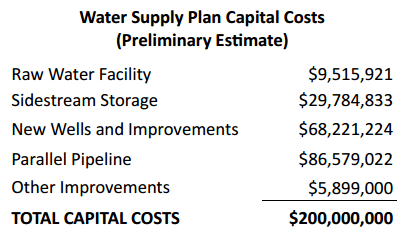In an advertisement in the Wichita Eagle and in a mailer sent to Wichita voters, the “Yes Wichita” group makes a series of statements regarding plans for a new water supply. It’s important that Wichita voters be aware of the complete facts and context of these claims so that they make an informed decision on how to vote.
The city has proposed a one cent per dollar sales tax. The largest portion — 63 percent or $250 million — is earmarked for a new water supply. Voters will see this question on the ballots for the November 4, 2014 election.

Save taxpayers $221 million over 20 years in costs. This statement is true only if the Wichita city council decides to pay for ASR expansion by using long-term debt. That decision has not been made. Besides that, there are other ways to raise this money. And if using debt for water projects is bad, why did the city borrow over $200 million for the current ASR project, and hundreds of millions for other water projects? See By threatening an unwise alternative, Wichita campaigns for the sales tax.

Tourists, visitors and renters help pay for our water. This is true. It is also true that if funds were raised through higher water bills, these people would also pay. Also, city documents regarding the sales tax state: “The State of Kansas estimates that 13% of sales taxes paid in the Wichita area are paid by non-residents based on a report at www.ksrevenue.org/pullfactor.html.” But at the “Yes Wichita” website, there is a different claim: “If we fund a new water source through a sales tax instead of water bills or property taxes, visitors and tourists will pay the sales tax, reducing the burden of this cost to Wichitans by about one-third.” Which is it? 13 percent, or 33 percent? Will “Yes Wichita” show us their figures or provide a reference for the basis of this claim?
Prevent future high water rate increases. This is true. If we experience a prolonged drought, water rates would have to rise to cover the fixed costs of the water utility. That is, if we have such a drought. That may not happen, or it may not happen for many years.
Fund ASR improvements which would provide new wells and a water storage site. This is true. What’s left is to decide whether making these additional investments in the ASR project is wise. We’ve learned that the expectations of ASR have been cut in half. We’ve learned that the ASR project is still in its commissioning phase, and it has not been turned loose for actual production for any significant period. I do not believe we have enough knowledge and experience to judge the success or failure of ASR. See Should Wichita expand a water system that is still in commissioning stage?
Leave a Reply